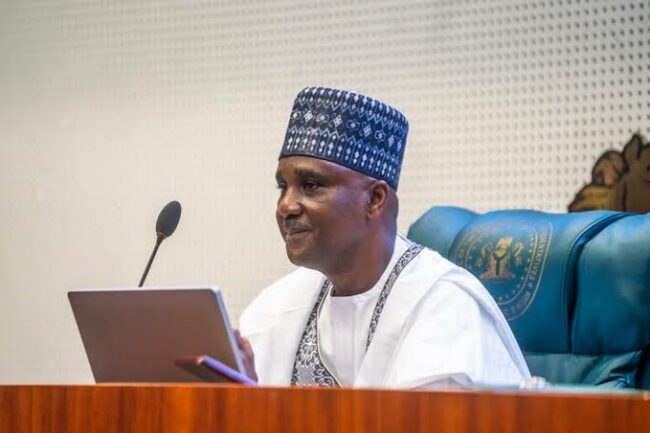Speaker of the House of Representatives, Hon. Tajudeen Abbas on Monday affirmed that corruption undermines Nigeria’s development in profound ways.
Hon. Abbas stated this in in Abuja during the commemoration of the UN International Anti-Corruption Day 2024, with the theme: ‘Uniting the Youth against corruption: Shaping tomorrow’s integrity’, argued that corruption “drains resources that could be channelled towards building infrastructure, creating jobs, improving education, and providing healthcare.
“Billions of dollars are lost annually to corrupt practices, depriving communities of basic services and perpetuating poverty and inequality. It erodes the social fabric by creating inequities that leave the most vulnerable further marginalised. Equally troubling is how corruption destroys trust in public institutions, leading to widespread disillusionment and a weakened social contract between the government and the governed.”
While noting that issue of corruption has immense significance to our national development and governance – corruption, the Speaker maintained that: “this pervasive challenge has far-reaching implications for every aspect of our society and remains one of the most formidable obstacles to our collective progress. As leaders and policymakers, we must continue confronting it with resolute determination and innovative solutions.
“Parliaments, as the heart of representative democracy, play a pivotal role in the fight against corruption. Through enacting laws, rigorous oversight of public institutions, and holding the executive accountable, Parliaments ensure that governance is conducted with transparency and in the best interest of citizens.
ALSO READ: FG seeks youth support in combating corrupt practices in Nigeria
“Moreover, as the custodian of the people’s trust, parliament serves as citizens’ voice demanding accountability, making our legislative functions central to combating corruption and restoring public confidence in governance.
“Corruption undermines Nigeria’s development in profound ways. It drains resources that could be channelled towards building infrastructure, creating jobs, improving education, and providing healthcare. Billions of dollars are lost annually to corrupt practices, depriving communities of basic services and perpetuating poverty and inequality.
“It erodes the social fabric by creating inequities that leave the most vulnerable further marginalised. Equally troubling is how corruption destroys trust in public institutions, leading to widespread disillusionment and a weakened social contract between the government and the governed.
“The Nigerian National Assembly has made significant strides in addressing corruption through legislative efforts aimed at institutional reform and accountability. We have passed critical laws such as the Nigerian Financial Intelligence Unit (NFIU) Act, which strengthens our capacity to track illicit financial flows, and the Proceeds of Crime Act, which ensures effective recovery and management of assets acquired through corrupt means.
“Another landmark reform is the Companies and Allied Matters Act (CAMA) amendment, which enhances transparency in corporate governance, thereby curbing avenues for corruption in the private sector.
“The current House of Representatives has prioritised anti-corruption in its legislative agenda, reflecting our unwavering commitment to addressing this issue comprehensively. We are reviewing existing anti-corruption laws to strengthen enforcement mechanisms and close any legal loopholes enabling corrupt practices.
“For example, the House is working to amend the Independent Corrupt Practices and Other Related Offences Commission (ICPC) Act to enhance its capacity to effectively investigate and prosecute corruption cases.
“Additionally, we are advancing the Whistleblower Protection Bill to encourage individuals to expose corrupt practices without fear of reprisal. Our increased oversight of government institutions complements these efforts to ensure public resources are managed with the utmost integrity and accountability.”
While applauding the House Committee on Anti-Corruption for its outstanding efforts in leading this fight by investigating corruption cases, engaging with stakeholders, and advancing critical legislative reforms, he averred that the Committee’s work reflects the shared resolve of the House of Representatives to strengthen institutional frameworks that uphold the values of transparency and accountability.
He, however, argued that the “legislative efforts alone are insufficient to eradicate corruption. The fight against corruption requires a collaborative approach involving civil society, the private sector, and the international community.
“Civil Society Organisations must continue to play their vital role in advocating for transparency and monitoring government activities, while partnerships with international bodies can enhance our capacity to tackle cross-border corruption and recover stolen assets.
“At the same time, empowering citizens to demand accountability and participate actively in governance will strengthen our collective resolve to build a corruption-free society.
“Corruption is not just a governance issue; it is a moral imperative that tests our institutions’ integrity and our leaders’ commitment. As parliamentarians, we must lead by example, ensuring our actions reflect the highest standards of probity and dedication to public service. The task before us is enormous, but so is our determination to overcome it.
“Let us remain steadfast in our commitment to eradicating corruption, promoting good governance, and fostering sustainable development. Together, we can build a Nigeria where every citizen has an opportunity to thrive, free from the debilitating effects of corruption.”
READ MORE FROM: NIGERIAN TRIBUNE
Get real-time news updates from Tribune Online! Follow us on WhatsApp for breaking news, exclusive stories and interviews, and much more.
Join our WhatsApp Channel now
